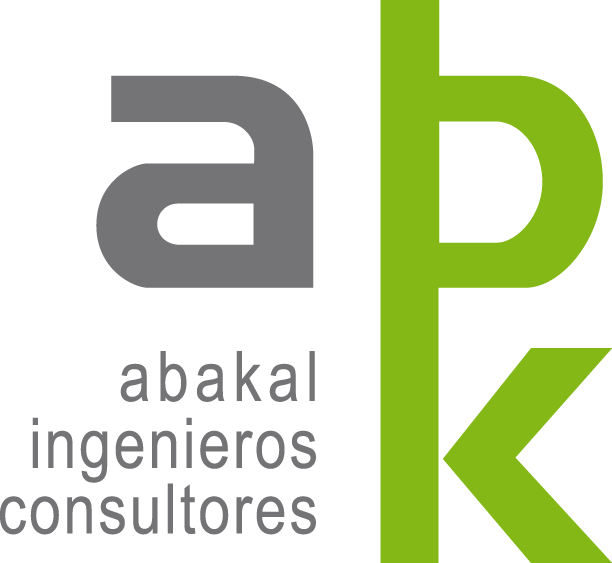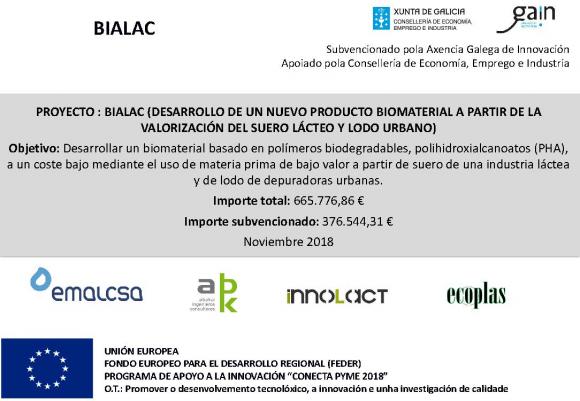 The main objective of the project is to develop a biomaterial based on biodegradable polymers , polyhydroxyalkanoates (PHA), at a reduced cost through the use of raw materials of low value and difficult to recover for project participants, such as permeate from the ultrafiltration process in the dairy industry and sludge from urban treatment plants. The project will simultaneously reduce the production costs of biopolymers , enhance permeate and sewage sludge, and produce new 100% biodegradable food packaging formulations .
The main objective of the project is to develop a biomaterial based on biodegradable polymers , polyhydroxyalkanoates (PHA), at a reduced cost through the use of raw materials of low value and difficult to recover for project participants, such as permeate from the ultrafiltration process in the dairy industry and sludge from urban treatment plants. The project will simultaneously reduce the production costs of biopolymers , enhance permeate and sewage sludge, and produce new 100% biodegradable food packaging formulations .
During the first year of development of the project, the initial tasks of preparing the facilities to house the biopolymer production pilot plant, plant design and characterization of the permeate and sludge have been carried out. treatment plant, both from the physical-chemical point of view and with respect to its anaerobic digestion potential and the limiting factors of the production of volatile fatty acids, polymer precursors.
During the second year, the characterization studies of the permeate and sludge continued, the design of the pilot plant for the production of biopolymer was completed and installed in the factory of Quescrem , then proceeding with its start-up and adjustment of the process parameters.
During the third and last year of the project, the characterization studies of the permeate as food for the pilot plant continue and with the operation of the same for the production of volatile fatty acids and biopolymer. Controls of the operating process, sampling, analysis of the basic operating parameters of the reactors, etc. are carried out on a daily basis, keeping track of the entire process and operating conditions. Similarly, laboratory-scale co-digestion studies continue to better adjust the operating process of the plant. As it stabilizes and biopolymer production is achieved, extraction and purification processes are carried out. The characterization of the biopolymer then continues, evaluating its thermal and rheological properties, and the necessary formulation is made for the development of a biocomposite suitable for its application. Finally, the validation of the containers obtained from it is carried out.
This project has had a duration of 2 years and 4 months, beginning in May 2018 and ending in September 2020. Several entities have participated in the development of the project (Emalcsa , Ecoplas , Abakal Ingenieros and Innolact , with the collaboration of research groups of the Universidad da Coruña ), with a budget total of € 665,776.86.
This project has been subsidized by the Galician Innovation Agency, supported by the Ministry of Economy, Entrepreneurship and Industry, and co-financed by the ERDF (European Regional Development Fund) of the European Union.
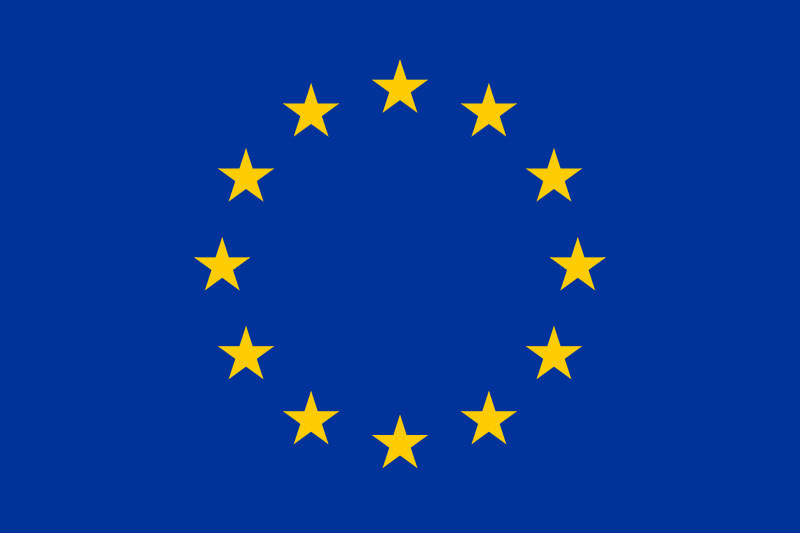 Europe has a clear objective, to achieve the climate goals set in the Paris agreement, the path, to reduce greenhouse gases until their elimination in 2050.
Europe has a clear objective, to achieve the climate goals set in the Paris agreement, the path, to reduce greenhouse gases until their elimination in 2050.
Last Wednesday it was known that the European Union has taken the lead in the race to use hydrogen as a non-polluting source of energy. It is expected that in the next decade, 45% of the investments in this field will be made in the territory of the continent.
Of the 228 hydrogen-related projects announced globally, 126, more than half, will be carried out in European Union territories. "Stable political commitment allows the industry to have the confidence to act," said the director of the Hydrogen Council.
The 300 billion dollars budgeted for the development of hydrogen, barely represent 1.4% of total investments in the energy sector, but it is estimated that the percentage will grow in the coming years. In Spain, for example, 38 hydropower plants are planned to start up before 2025.
Source: Euractiv.
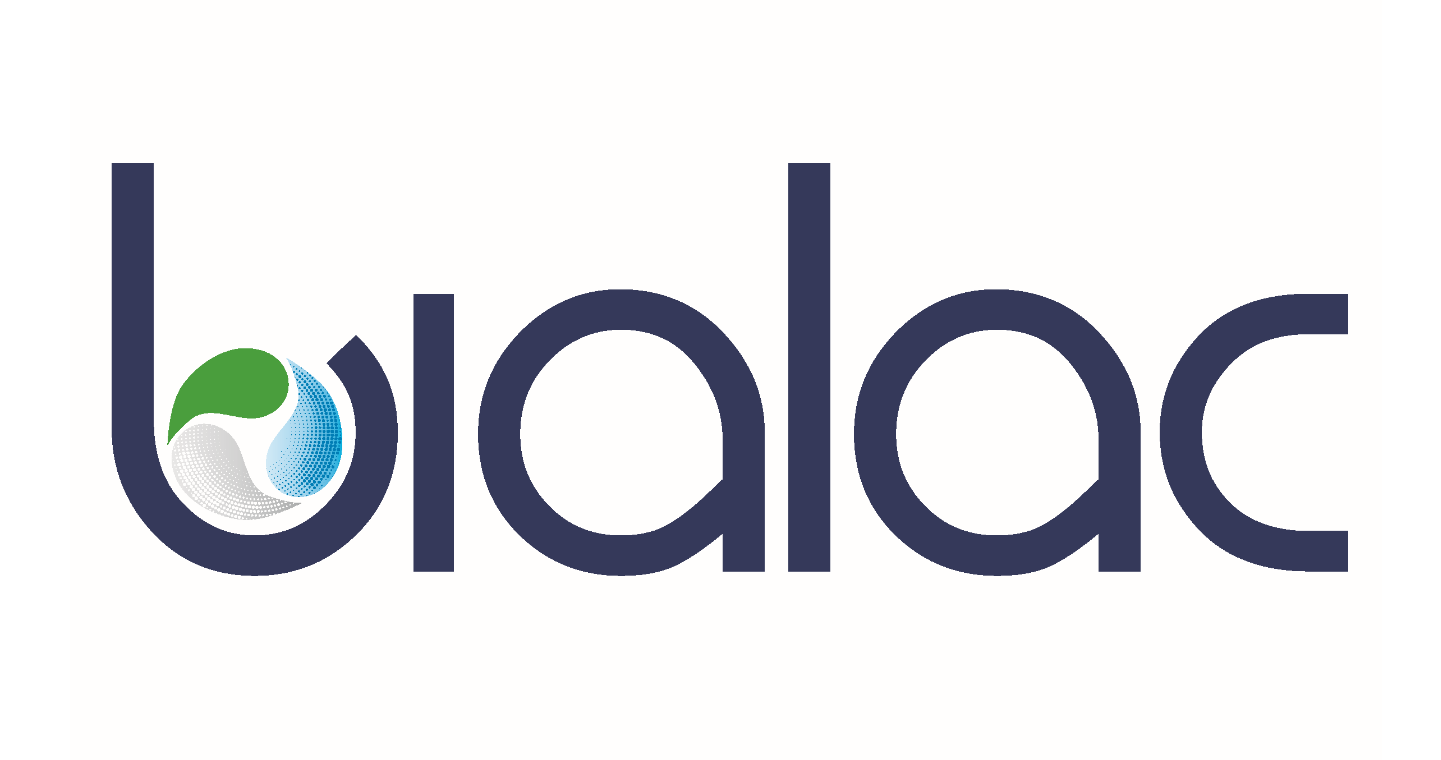 Abakal, in conjunction with Emalcsa– the municipal water company of La Coruña – and the companies Innolact and Ecoplas with the collaboration of the A Coruña University are working on the development of a new biopolymer from whey from industries in the area and urban sludge from Galician treatment plants, in the framework of the BiALAC project.
Abakal, in conjunction with Emalcsa– the municipal water company of La Coruña – and the companies Innolact and Ecoplas with the collaboration of the A Coruña University are working on the development of a new biopolymer from whey from industries in the area and urban sludge from Galician treatment plants, in the framework of the BiALAC project.
In 2019, the biochemical tests and the project of the different phases of the pilot plant were completed to achieve the transformation of the fatty acids of these by-products into biodegradable bioplastics. Once this laboratory phase was completed, the construction of a pilot plant that incorporates this process was completed in 2019 in order to increase the production of these bioplastics and assess their availability on an industrial scale.
The different possible configurations of the pilot plants are currently being tested and conclusions are being drawn for the real-scale implementation of an efficient bio-plastic production plant. The bio-polymers obtained have application as plastic materials from renewable and sustainable sources that in a short time will be of mandatory use in the food industry.
In conclusion, the BiALAC project will allow industries to give added value to the by-products of their production and to reuse waste from treatment plants. With this system, food companies will be able to be at the forefront in terms of circular economy policy in relation to by-products and raw materials in their packaging.
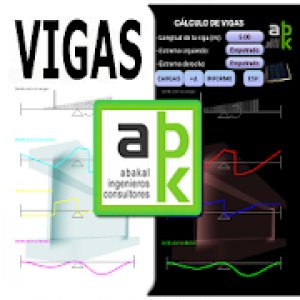 Our colleague Luis Nieto, has developed in ABAKAL a free application for calculating beams on Android devices.
Our colleague Luis Nieto, has developed in ABAKAL a free application for calculating beams on Android devices.
This program facilitates the calculation of bending, shear and deflection moments in a beam of constant section in a very simple way.
To do this we will have to indicate the length of our beam and add its supports. Once this is done, we can add the moments and loads, both punctual and distributed, to which the beam is subjected. The distributed loads can be uniform, trapezoidal or triangular, depending on the value that we indicate at the ends.
Once our beam is configured, the application will carry out the necessary calculations and prepare a report with the values of moments, shear and deflection. We can export this report in csv format to be able to consult it in a spreadsheet on our computer. In the application we can quickly consult the specific values of each magnitude simply by moving your finger through the diagrams.
Donwload App.
App Manual.
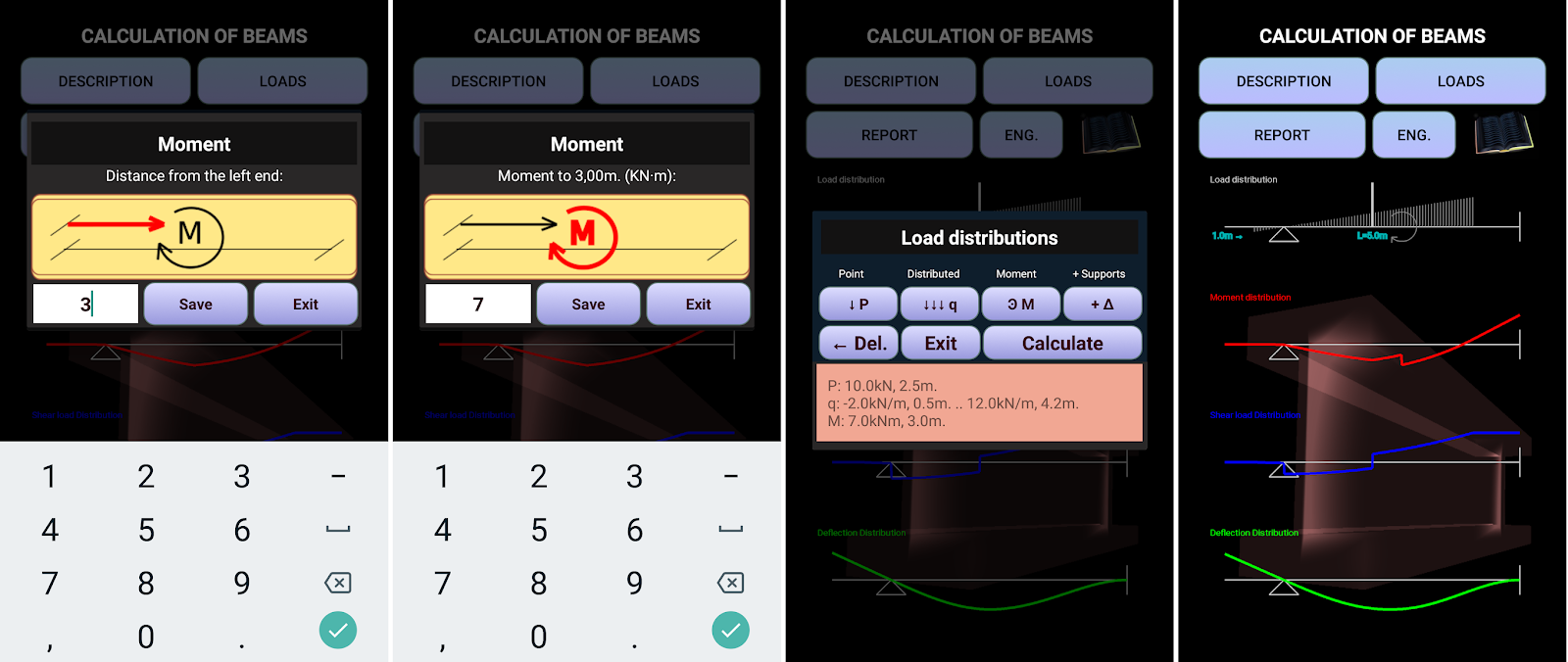
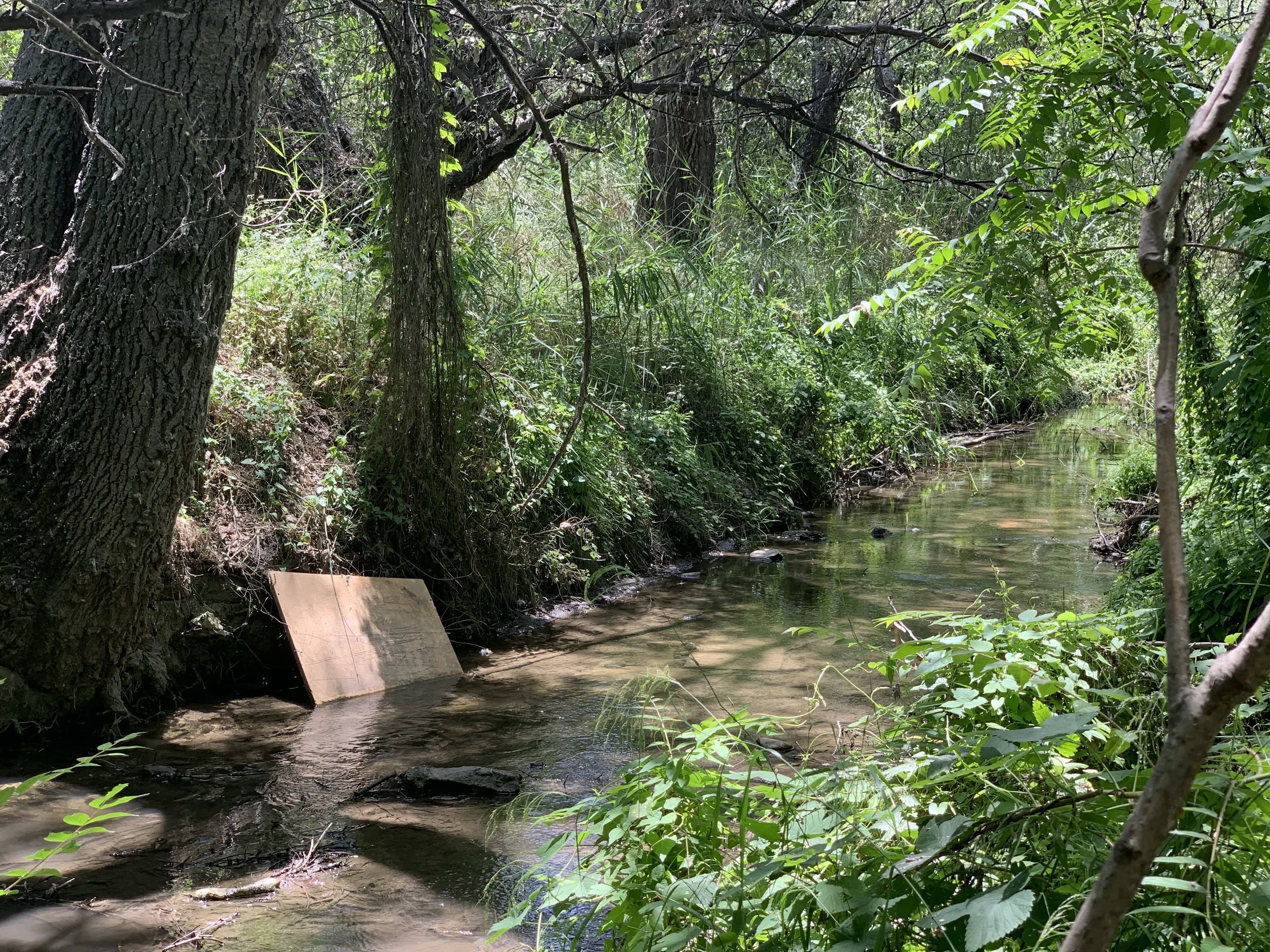 In the 16th century, Cardinal Cisneros bought the Borgoñón mill to donate it to the Colegio Mayor de San Ildefonso. This mill is powered by a water diversion tank through which almost 3,000 L/s have circulated. However, after years of disuse, the mill and the watercourse need to carry out works to integrate them into the urban landscape of the city.
In the 16th century, Cardinal Cisneros bought the Borgoñón mill to donate it to the Colegio Mayor de San Ildefonso. This mill is powered by a water diversion tank through which almost 3,000 L/s have circulated. However, after years of disuse, the mill and the watercourse need to carry out works to integrate them into the urban landscape of the city.
Last may, the Council of Alcalá de Henares formalized a contract that seeks to improve the river environment, which is in tune with the large recreational area of the College Island composed of urban gardens of the European Horizon 2020 project, sports courts, parks and walks.
The works in the mill watercourse will consist of cleaning and recovering the watercourse and putting it into service, respecting at all times the riverside vegetation, the gallery forest and the fauna that has been established throughout these years, allowing the citizens of Alcalá de Henares enjoy this space.
From Abakal we hope that this objective is fulfilled and that the people of Alcalá take advantage of all the possibilities that the College Island, the watercourse of the Mill and the Henares river can offer them.
Press release Council of Alcalá de Henares
Horizon 2020
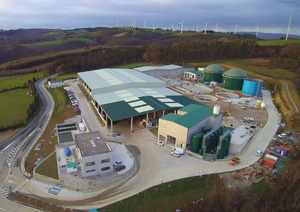
ABAKAL is in charge of the construction management of the SOLOGAS project. As a waste recovery center, it will have a composting plant, an WWTP for 1,000 m3/d, as well as with two biodigesters with the capacity to treat up to 55,000 T of sludge generating about 2 MW.
In addition, a new system for loading and crushing solids has been arranged, directly from the unloading of the sludge and biomass trucks.
The plant has a sectorized reception, classification and storage system for liquid waste, with a capacity of more than 1,500 m3.
It has a 30,000 m3/year acid water treatment and conditioning facility and a hazardous liquid waste evaporator with a capacity of 37,000 m3/year. The energy of the evaporator is obtained from the biogas of the biodigesters. The objective of the plant is the minimization of waste output and the conversion of all inputs into reusable valued products, such as fertilizers, energy or ammonium sulfate.
Among the main functions that ABAKAL develops in the SOLOGAS project are:
- Coordination between the main suppliers, ensuring a correct implementation of the various technologies.
- Detailed engineering of the works
- Compliance with environmental requirements.
Find out more.

ABAKAL accredits the implementation of its Abakal Integrated Quality and Environmental Management System
, based on the spanish standardsUNE-EN-ISO 9001:2015 y UNE-EN-ISO 14001:2015

Abakal will participate in the development of a new biomaterial product based on the recovery of milk serum and urban sludge.
The most important objective of the project is to develop a biomaterial based on biodegradable polymers (bioplastics), at a low cost through the use of low-value raw material based on whey from a dairy industry and sludge from urban treatment plants. The process will at the same time reduce the production costs of biopolymers (polyhydroxyalkanoates, PHA), enhance milk serum and sewage sludge, and produce new 100% biodegradable food packaging formulations, thus contributing to a circular economy model.
At the same time, the production of volatile fatty acids (VFA), which are compounds of high value in the market, both economically and ecologically, will be studied.
Next Wednesday, December 11, 2019, the Seminary of the BIALAC project - Circular Economy and Bioplastics will take place.
We invite you all to attend to see first-hand the details of this R&D project, in which ABAKAL collaborates in the field of engineering.
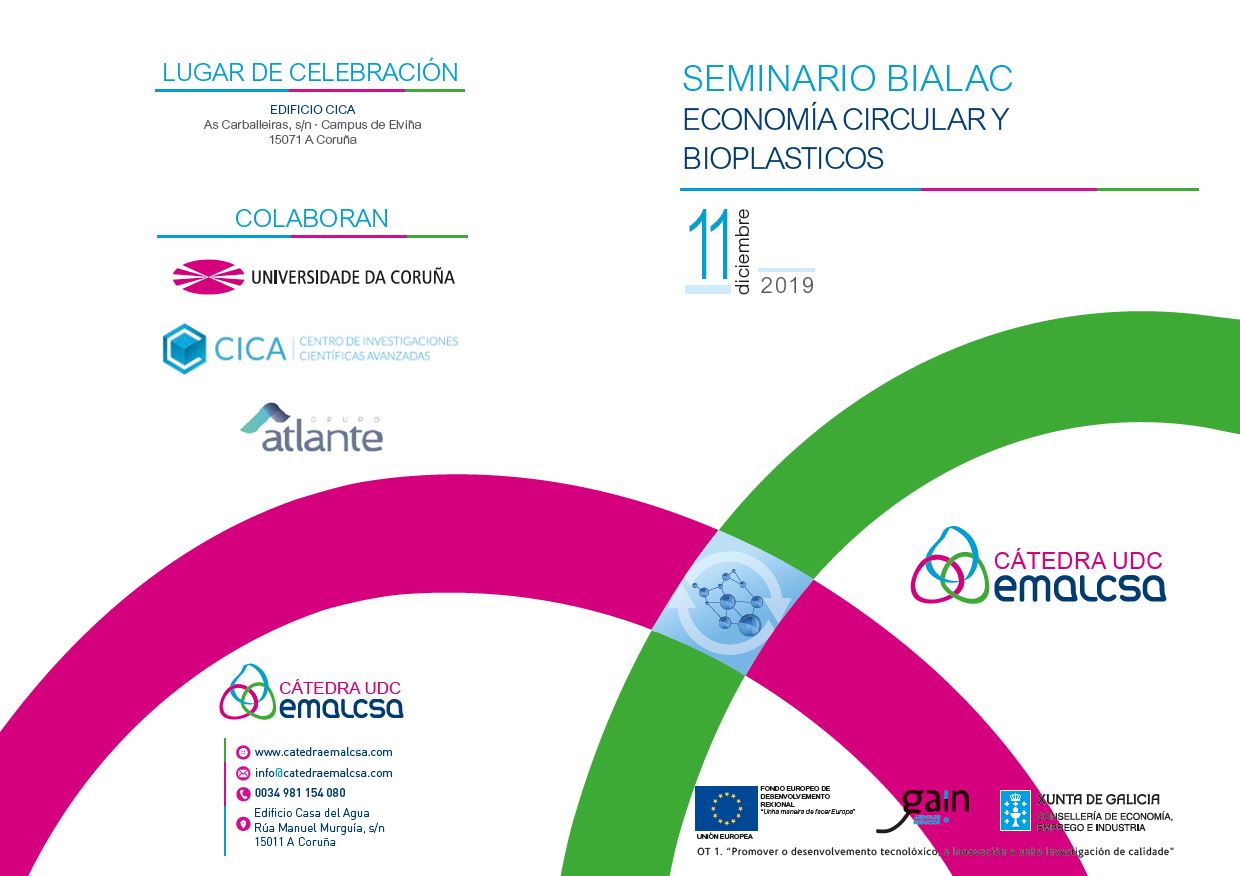
According to current disposal regulations, wastewater from industries and commercial activities must meet minimum requirements before being disposed of in municipal sewage collectors.
Each Government has its own legislation regarding discharges and this regulation is complemented by the municipal ordinances of each municipality. In the case of the Community of Madrid, it is included in the Decree 57/2005 of June 30 Ley sobre vertidos líquidos industriales al sistema integral de saneamiento
(BOCM nº 159, July 6, 2005).
As specialists, Abakal can advise you without obligation on the current legal situation of your discharge and draw up your Project for the Legalization of Discharges, carrying out all the necessary steps in front of the competent authority to process the discharge permit.
In addition, Abakal offers advice on the configuration of the treatment equipment, obtaining which is the most advisable to minimize the investment in compliance with the legislation.
Decree 57/2005.
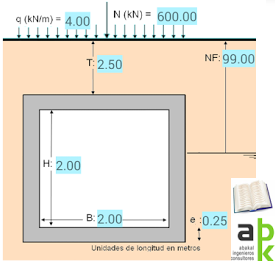
This App allows you to calculate concrete boxes for drainage, underpasses, etc.
With its simple and practical design, you can easly get results in a quickly and trustworthy way.
Process to obtain results is the following:
- Entering data.
- Load patterns definition.
- Bending moments.
- Shear stresses diagrams.
- Minimum quantities of reinforcing steel.
- Table of possible steel reinforcement.
With our application you can know the relation between concrete volumen and steel reinforcement, so that you can quicly check if the reinforced concrete box is above or below steel requirements.
Download App.

As a part of ABAKAL expansion project, we recently opened a fanpage on Facebook, so that we can get closer to present and future clients.
Get to know our projects, our free software, news in our work space and much more.
Be part of our family by clicking "Like" on our fanpage
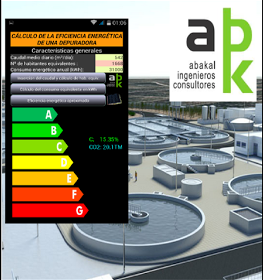
This App allows you to know energy efficiency of Wastewater Treatment Plant (WWTP), by just entering simply data.
Download App.
Illegal dumping increased by 40 % last year in Madrid

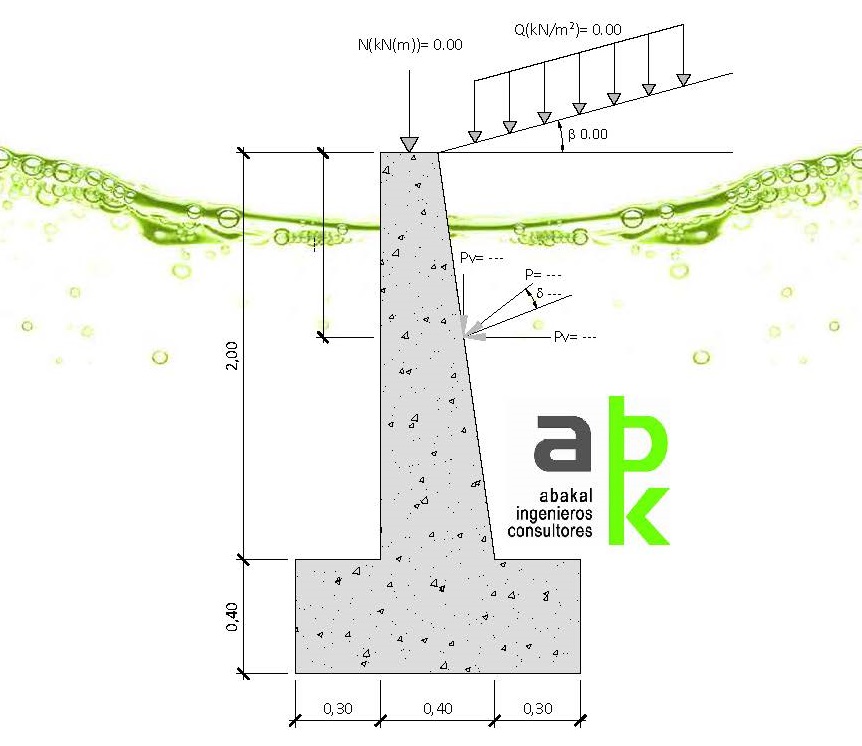
Luis Nieto Matarranz develop an ANDROID aplication for calculate concrete walls.
This App allows you to calculate the stability and concrete reinforcement of a wall for diferent type of soils and loads.
Download now the free app Download App.
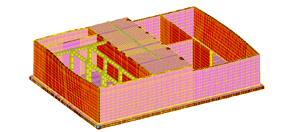
Abakal performs the structural design of a wastewater treatment plant for the fish process industry in Ghana.
The reinforced concrete structure will contain 3,400 m3 of wastewater produced by a tuna processing industry. The main dimensions are 34 length and 24 wide. The structure comprises micropiles due to the weak layer of soil under the treatment plant and the high seismicity levels of the area.
It was designed following the Eurocodes and the Ghana Building Code and it was modelled using the structural calculation software SAP
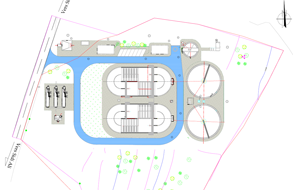
Abakal participates in partnership with Meheleb Messaoud&Fils in the tender process of the wastewater treatment plants of Sidi Ali, Sidi Lakhdar and Khadra in Algeria.
Abakal presents its bid for the design and construction of three wastewater treatment plants funded by the Algerian Minister of Water
The treatment process of the three plants comprises a preliminary treatment and a biological treatment designed to treat a combined wastewater flow of 21,000 m3/day and an a equivalent population of 105,000 equivalent – inhabitants.
The plants were designed to keep the required maintenance and operation control to the minimum due to the local limitations to perform an intense supervision of the plant but keeping a high level of treatment that allows the reuse of water. The environmental integration was highly taken into account with an intense study of the area.
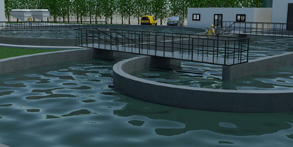
Abakal Ingenieros Consultores works together with Paymacotas in the technical bidding for the new wastewater treatment plant of Gandarío (A Coruña, Spain). The proposed solution perfectly suits the demanding discharge regulations applying in the area due to its high environmental and touristic value.
The new wastewater treatment plant of Gandarío is designed to treat the wastewater of 6,000 equivalent inhabitants with an average flow of 2,300 m3/h an a peak flow of 340 m3/hour.
The treatment process includes a tertiary treatment comprising a microfiltration process and UV disinfection unit. The UV treatment is designed with self-cleaning system and its power consumption is regulated in accordance with the variation of the wastewater flow.
The new wastewater treatment plant is designed with the best automation technology and security systems. The landscape alteration is minimized thanks to an excellent environmental integration. Odour and noise are mitigated using the best equipment and the treated water is reused for irrigation.

ABAKAL has been awarded with the contract “Design of preliminary project of sewerage system and wastewater treatment at Tavernes de Valldigna (Valencia, Spain)”
The award includes:
- Preliminary project of a 95.000 p.e. WWTP with a flow rate of 19.000 m3/d and tertiary treatment for water reuse.
- Nine detailed projects for a 10 km long sewer network, three pumping systems of 150 L/s, 180 L/s and 185 L/s with a 5.5 km ductile iron impulsion system with a diameter of 450 mm.
- Demolition projects for existing facilities.
- Acoustic study.
- Environmental impact study.
- Discharge authorization.
Source: Ayuntamiento de Tavernes de la Valldigna.
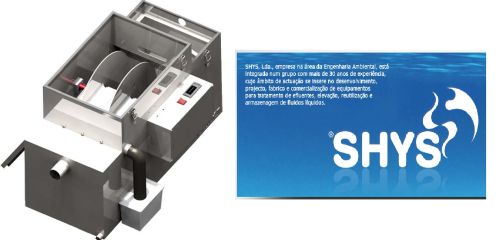
ABAKAL will provide SHYS with engineering services for wastewater treatment plants in the Portuguese market.
 The main objective of the project is to develop a biomaterial based on biodegradable polymers , polyhydroxyalkanoates (PHA), at a reduced cost through the use of raw materials of low value and difficult to recover for project participants, such as permeate from the ultrafiltration process in the dairy industry and sludge from urban treatment plants. The project will simultaneously reduce the production costs of biopolymers , enhance permeate and sewage sludge, and produce new 100% biodegradable food packaging formulations .
The main objective of the project is to develop a biomaterial based on biodegradable polymers , polyhydroxyalkanoates (PHA), at a reduced cost through the use of raw materials of low value and difficult to recover for project participants, such as permeate from the ultrafiltration process in the dairy industry and sludge from urban treatment plants. The project will simultaneously reduce the production costs of biopolymers , enhance permeate and sewage sludge, and produce new 100% biodegradable food packaging formulations . 
 Europe has a clear objective, to achieve the climate goals set in the Paris agreement, the path, to reduce greenhouse gases until their elimination in 2050.
Europe has a clear objective, to achieve the climate goals set in the Paris agreement, the path, to reduce greenhouse gases until their elimination in 2050. Abakal, in conjunction with
Abakal, in conjunction with  Our colleague Luis Nieto, has developed in ABAKAL a free application for calculating beams on Android devices.
Our colleague Luis Nieto, has developed in ABAKAL a free application for calculating beams on Android devices.
 In the 16th century, Cardinal Cisneros bought the Borgoñón mill to donate it to the Colegio Mayor de San Ildefonso. This mill is powered by a water diversion tank through which almost 3,000 L/s have circulated. However, after years of disuse, the mill and the watercourse need to carry out works to integrate them into the urban landscape of the city.
In the 16th century, Cardinal Cisneros bought the Borgoñón mill to donate it to the Colegio Mayor de San Ildefonso. This mill is powered by a water diversion tank through which almost 3,000 L/s have circulated. However, after years of disuse, the mill and the watercourse need to carry out works to integrate them into the urban landscape of the city.













